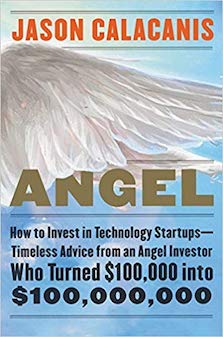 A bit different market but I got some interest in the startup world to build a small long-term portfolio of possible unicorns next to my trading business. This book is the most recommended one in our local investing community so I decided to listen to the audiobook of Angel by Jason Calacanis, published in 2017.
A bit different market but I got some interest in the startup world to build a small long-term portfolio of possible unicorns next to my trading business. This book is the most recommended one in our local investing community so I decided to listen to the audiobook of Angel by Jason Calacanis, published in 2017.
Jason Calacanis had an early success with Uber. Uber was actually one of his first five investments to startups. Two out of five were successful for him. So call it luck or skill but he managed to get success from the get-go. There are some good points he makes about startup investing.
It’s the most riskiest but most rewarding asset class for investments. That’s why risk management is so important. He suggests something like investing 10% of one’s total equity into 20-40 different startups. Investments should be done with 10 years of perspective.
He likes technology and AI sectors where new companies can change the world, replace jobs with state-of-the-art inventions etc. You want to hear out people with crazy ideas, different personalities and network with them. Investors often have doubts in crazy ideas that prove to work out later on.
He puts emphasis on the location – Silicon Valley is the universe, you need to be there. He says NYC and LA are too small for startup investors; has negative feelings about Europe, if anything then Sweden is okay. Chinese technology is also good but there’s the risk of politics.
Angel investors are not just for money, but also for time, network, expertise to help the company. He calls investors who put in time and effort instead of money as “broken angels”.
Funding rounds – sweat equity (the founder has already done some work without just waiting for the check and if the company runs out of money there’s more chance the founder will work on); Bootsstraping, Friends & Family funding. Follow-on rounding depends on the success so far, faith in the business and valuation. Series A rounding when business gets bigger, VC investors, management etc. Then the path towards exit starts for an angel investor.
$100B+ startups are Apple, Google, FB, Cisco, Microsoft. $10B+ startups are Uber, Tesla, Airbnb (from incubator). $1B+ startups are Pinterest, Dropbox, Stripe (all from incubators).
If you’re getting involved in angel investing, first meet as many people as possible but invest in as few deals as possible, you need to find the right founders. You bet more in the people than the idea. 10 years ago you needed $25-50k per investment, today there are P2P syndicates (SPV). You will have more chance as an angel than a founder or employee.
Jason Calacanis suggests you start with 10 syndicates $1k each: lead investor with 5 years of experience and at least 1 unicorn; Silicon Valley; at least 2 founders; product or service already in market; either 6 months user growth or revenue; noticeable investors; 18 months of runway. Next 20 investments $25k each. Then $100k each to your top 5 startups.
Write deal memos: why invest, risks, what needs to happen. Notes why you passed a deal. Meet founders at least once. Meet fellow investors: what they invest in and why; what value they bring to startups; what value do you; have they seen anything interesting lately; would they meet founders; do they prefer introductions or blind intros. Build a network. Become an insider.
Eliminate small ideas and weak founders. Double down on great ones. Product-market fit. Hired CEOs rarely work. Ask before a meeting: how many employees; how much revenue; how many investors; how are they acquiring customers; why building the business. Technical questions: competition; how you make money; how much do you charge customers; how much avg. customers spend; top 3 reasons to fail. Personal questions: what do your parents do (for bonding).
Check the pro rata rights to keep your % in future rounds by continuing to buy shares. How did you get to that valuation? (Good answer is revenue, user growth etc).
Due diligance. If don’t want to say “No”, say “Not yet” and ask for monthly updates. Founders sometimes lie; ask for revenue, users, investors etc. and check the facts.
Starting is easy, finishing is hard. Exits. Startups are not to sell too early but consider possible growth and diversify after IPO.
In conclusion, this asset class seems interesting to explore more and diversify trading business with having 10% of the equity in 20-40 technology startups.
Angel by Jason Calacanis book link
Share this post